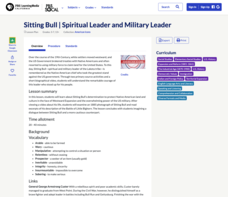State Bar of Texas
Gibbons v. Ogden
Have you ever played the game Monopoly? Do you know what it takes to win the game correctly? Scholars research the nature of outlawing monopolies in the United States while controlling trade. They investigate the court case Gibbons v....
College Board
Civic Knowledge and Action in AP U.S. Government and Politics
Vote, it's your civic duty! The high school lesson focuses on voter turnout and civic participation with a series of activities. Young scholars analyze data to discover voter turnout trends, complete worksheets, and participate in group...
National Endowment for the Humanities
Writing a Diplomatic Toast
Here's to you! Using a role-playing activity and primary source analysis, learners discover the importance of diplomacy. Impersonating a diplomat from a great empire, they write a toast to another empire, analyzing the strengths and...
Gilder Lehrman Institute of American History
Women's Suffrage: 140 Years of Struggle
Young scholars create PowerPoint presentations about women's suffrage. In this women's rights instructional activity, students use primary documents to study the women's suffrage movement. In pairs, young scholars create a PowerPoint...
Advocates for Human Rights
Deliberative Dialogue
How do you create a classroom environment where hot button topics may be discussed in a respectful manner? As part of a series of lessons that focus on immigration issues, class members examine the rules for civil discussion before...
Population Connection
Meeting Human Needs
How to meet the needs of people around the globe—a question many ask. The fifth in a six-part series about human population and its effects on the globe, the eye-opening lesson includes discussion, a homework activity, and an in-class...
State Bar of Texas
Wisconsin v. Yoder
How far does freedom of religion truly go? The 1972 Supreme Court case Wisconsin v. Yoder introduces the concept of the free exercise clause of the First Amendment. Individuals examine the case with a short video and open discussion. To...
State Bar of Texas
Dred Scott v. Sandford
Who decides someone is not a real person? Scholars investigate the Dred Scott v. Sandford court case which deals directly with slavery and citizenship. After viewing a short video clip, classmates work in pairs to assess and discuss the...
Judicial Learning Center
Do You Know Your Bill of Rights?
The Bill of Rights is much more than an important piece of paper! The rights cover everything from freedom of speech to the right to remain silent if arrested. Scholars find out their own rights by answering the questions in the form of...
Ford's Theatre
Not Just Stone and Metal: Memory and Monuments Today
Should we remove historical Confederate monuments? Teach scholars both sides to the story using a resource that includes a class discussion, reading materials from two prominent figures on both sides of the argument, and an assessment...
PBS
Sitting Bull: Spiritual Leader and Military Leader
Sitting Bull was not expected to be a great warrior. Yet, he led the Lakota people and other tribes to several pivotal victories against the United States government when federal troops threatened their land. Using primary sources, such...
PBS
Organizing the Farm Worker Movement
The food on young scholars' tables was likely harvested by hands that fought for fair wages and working conditions. By examining the life of Cesar Chavez and Dolores Huerta, learners connect their daily meals with the struggles of those...
Encyclopedia Britannica
Electoral College Philosophical Chairs Debate
Because of the Electoral College, it is possible to win the popular vote in a US Presidential election and still lose the election. After researching the pros and cons of the Electoral College, class members engage in a structured debate...
Curated OER
Then and Now: Life in Early America, 1740 - 1840
Students complete a unit of lessons that examine life in early America from 1740-1840. They compare items with similar objects we use today, explore various websites, create a paper doll, try and guess the function of various objects,...
Alabama Department of Archives and History
Alabama's Secession in 1861: Embraced with Joy and Great Confidence. Why?
From December 20, 1860 to June 8, 1861, eleven states seceded from the Union. Alabama seceded on January 11, 1861. Why did so many white Alabamians want to secede? Why did they believe the South could win the war? These are the essential...
Alabama Department of Archives and History
Convict Leasing in Alabama: a System That Re-Enslaved Blacks After the Civil War
The post-Civil War convict leasing program, rarely covered in textbooks, is the focus of a lesson that asks class members to use information drawn from primary source documents to assess the program. While the focus is on Alabama's...

















